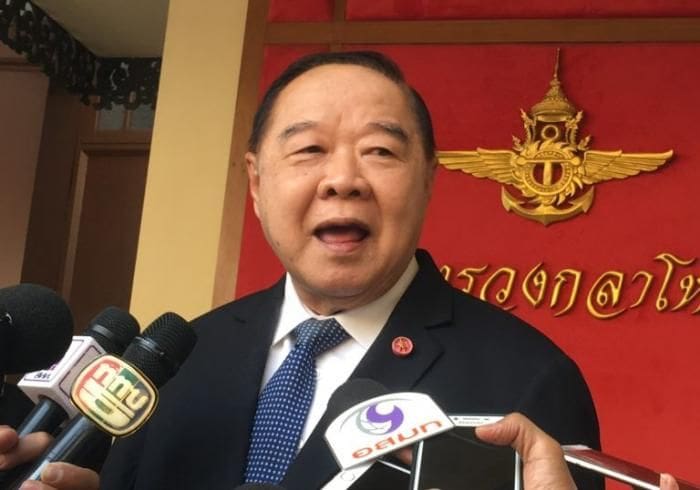“There may be a substitute prime minister,” says deputy PM Prawit

If Thailand’s PM Prayut Chan-o-cha fails to hold his position as PM, “there may be a substitute prime minister”, according to deputy PM Prawit Wongsuwan. However, PM Prayut said he hasn’t heard anything about a potential stand-in for his post. Palang Pracharat, and coalition MPs have continued to publicly support the current PM, but say, if the position was to become vacant, cthe deputy PM is the “best candidate” for the job. So could Rolex-wielding and 76 year old Prawit really replace PM Prayut?
PM Prayut’s position could be undermined in an upcoming censure debate in Parliament, brought about by opposing political parties, opening up the opportunity for a substitute PM to step in.
The no-confidence debate, expected to take place sometime after May 22, will discuss whether PM Prayut is still deemed fit to hold his premiership. Even the prime minister’s political supported in the coalition are reportedly not happy that PM Prayut keeps refusing to reshuffle the cabinet and promote them into better positions.
More than a dozen MPs from Prayut’s ruling party – Palang Pracharat – have left (or were expelled from) the party and set up the Setthakit Thai, or “Thai economic” party. PM Prayut’s position could be at risk if Setthakit Thai MPs, or MPs from other coalition parties, choose to vote against him in the debate.
Secretary-general of Setthakit Thai Thammanat Prompow, who was expelled from PM Prayut’s party in January, allegedly demanded 2 seats in the Cabinet in return for supporting the government. He will be wanting his political pound of flesh after being undermined by Prayut.
Thammanat, how could we forget, is the MP who was serving under the Prayut government with a dark past, including a 4 year stint in a Sydney prison over heroin trafficking charges, charges he has consistently denied.
PM Prayut, Deputy PM Prawit and Thammanat used to have amicable relations before Thammanat challenged PM Prayut’s power in a no-confidence vote last year. Prawit has consistently mentored Thammanat, fracturing his long-standing relationship with the the PM. Setthakit Thai MPs now describe Prawit as “the best candidate” for the premiership.
Another threat to PM Prayut’s position is the debate around whether his premiership has hit the 8-year constitutional limit or not. Thailand’s constitution says, “the prime minister shall not office for more than eight years in total.” However, people can’t agree whether Prayut became PM in 2014 (when the Army took power in the most recent coup), 2017 (when the NCPO was dissolved and a new constitution came into effect) or in March 2019 when the country held a general election and both Houses of Parliament voted Prayut into the top job.
According to some, Prayut became ex-officio ‘PM’ on May 22, 2014 when the Army, led by General Prayut, seized power over Thailand by a military coup. If so, his 8 years will be up in 2022, bringing his premiership to a close in accordance with the constitution.
Others argue that Prayut didn’t officially become PM until April 6, 2017, when the current constitution came into force. Others say Prayut’s premiership began as recently as June 9, 2019 after the ‘general election’ that year. If so, he has a little while longer at the top (providing he isn’t voted out).
If PM Prayut’s premiership ends this year, Prawit will most probably step in to replace him, according to Wissanu Kreangam, the government’s legal advisor.
The law says if PM Prayut is ousted, a parliamentary meeting of both houses will be called to select a new PM from the 5 candidates already nominated by political parties before the 2019 election. The 5 candidates include: Abhisit Vejjajiva of the Democrat Party, Anutin Charnvirakul of the Bhumjaithai Party, and Chaikasem Nitisiri and Sudaret Keyuraphan both from the Phue Thai Party.
So how can Prawit get into the PM’s office if he’s not on the list? Well, a person outside the list can become PM if a joint meeting of the Lower House and Senate agree to renounce the list.
Alternatively, if PM Prayut calls an early election and attempts to become the PM candidate of a party that fails to get elected, Prawit could potentially emerge as substitute PM if he is nominated by Palang Pracharath party.
“If Prayut fails to pass the no-confidence vote, he will be ousted and Parliament will need to vote for a new PM”, says Stithorn Thananthichot, director of the Innovation for Democracy at the King Prajadhipok’s Institute.
However, the actual chance of a substitute PM stepping in is slim, according to Stithorn.
SOURCE: ThaiPbs
Latest Thailand News
Follow The Thaiger on Google News:


























